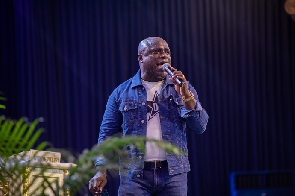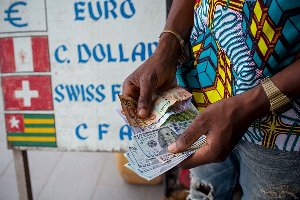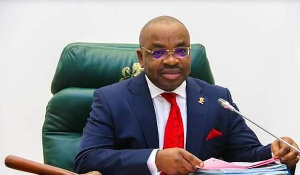GhanaWeb Feature
In his most recent revelations, the Member of Parliament for North Tongu, Samuel Okudzeto Ablakwa, exposed what is believed to be a double identity of the Secretary to the Board of Trustees of the National Cathedral of Ghana, Rev. Kusi Boateng.
In the revelations, the MP showed documents that proved that Rev. Kusi Boateng, who is also the founder of Power Chapel Worldwide, has used multiple names in various official capacities, including on passports.
The allegations have since been keenly contested by both the reverend minister and the National Cathedral Secretariat.
That notwithstanding, and seeing that there is a lot of talk about whether or not this is a criminal action, bearing in mind that some of the defenses that have been given to this are that the pastor’s other name is what he is known by at home, GhanaWeb explores the legal judgments on such matters.
In 2016, the Supreme Court of Ghana delivered a judgment in a case between Kofi Sarpong vs Franklin Adubobi Jantuah, where the court looked into a case of leased land.
The case, in summary, was about the double identity of the original owner of a land that had been leased to a certain Lebanese in 1953, and was to expire in 2003 but was passed on to another person because the foreign national, Ghassoub, died in 1966 or the 1970s, as dates were conflicting.
According to the details of the judgment, made available via lawsghana.com, a certain Madam Akua Addai, who is also deceased, took over the remaining term of the lease agreed on between Ghassoub and the original owner of the land, named as one Kwame Adu Bobi.
“The said Ghassoub, a Lebanese national, and one other Lebanese national took a fifty-year lease of this plot form the original lessee, one Kwame Adu Bobi, in 1953, for a term of fifty years, certain expiring on 31st January 2003. The record shows that the said Ghassoub died in 1966 or in the 1970s, as dates were conflicting. At any rate, he was not alive as at June 1975 when the surviving sub-lessee signed the remainder of the term to Madam Akua Addai in June 1975.
“The story as told by the plaintiff herein who advanced her some money in order for him, the plaintiff, to take over this property. That the real owner of the property, Kwame Adu Bobi, was present when the sub-lessee agreed to give the property to Madam Akua Addai. The plaintiff’s case further was that since July 1975, he had been in charge of this property as owner in possession.
“About five months to the end of the lease period, the defendant wrote to the plaintiff to put the property in tenantable repair in preparation for a reversion to the said Kwame Adu Bobi. When the plaintiff discovered that it was the defendant who was posing as Kwame Adu Bobi, he resisted his claim, accusing the former of impersonation. The defendant was also said to have collected various sums of money as rent advance from the sitting tenants,” it stated.
Conclusion of the Supreme Court on double names:
The case before the Supreme Court was brought after the plaintiff, Madama Akua Addai, sought redress from both the High Court and the Court of Appeal over what she said were impersonations by the defendant, Kwame Adu Bobi.
With the two lower courts ruling that they had established that the defendant was the same person bearing the names of Kwame Adu Bobi and Franklin Adubobi Jantuah, the plaintiff sought the interpretation of the Supreme Court.
The Supreme Court, after delivering its verdict, agreed with the judgments of the High Court and the Court of Appeal to the effect that the defendant was the very same person, for which reason it cannot override the decision of the lower courts.
“This is one case which in our candid opinion, should not have been embarked upon at all in the first place. The property in dispute is numbered O.T.B. 511, Block XXVI, Adum, Kumasi. The plaintiff/appellant/appellant, hereinafter called the plaintiff does not claim he owns the property in dispute by acquisition of the plot or by construction of the building thereon.
“He does not also claim the property by purchase or through inheritance. He claims the property because he is a sub-lessee whose sub-lease has expired so he has become the owner of the property unless the true owner thereof came forward to claim it.
“The defendant/respondent/respondent, hereinafter called the defendant, claims to be the true owner who acquired the plot in his native name and leased it to two named persons for a terms of fifty years to build on it and occupy same for that duration,” the judgment arrived at by the Justices of the Supreme Court, including the current Chief Justice, Anin Yeboah, said.
Additionally, the court concluded that it is not illegal for anyone to acquire property in their local names.
It explained that this is not wrong and as such, the case of impersonation that was brought against the above, Kwame Adu Bobi, does not hold.
“The trial court also considered that it is not illegal for any person to acquire property in his native name. The Court of Appeal considered this and concluded it did not violate any law unless there was proof that it was done with a criminal purpose,” it added.
Relevance of case to allegations of double names in relation to Rev Kusi Boateng:
Among the things Samuel Okudzeto Ablakwa, the Member of Parliament for North Tongu, accused the Secretary of the Board of Trustees of the National Cathedral, Rev. Kusi Boateng, of is that he bears two official names.
The MP, who provided documents to back up his claims, also demonstrated how the reverend minister had used the two names to benefit from the Secretariat, rather on their backside.
Going by the above judgment, should that same narrative be played by the Kusi Boateng case, it might not exactly fit in.
There is a premise that may not work out for the National Cathedral board member, and that is that things of legal matters work slightly differently.
As was also stated in the judgment of the Supreme Court justices, “It is common knowledge that among the Akans the name that is given at birth is very often not the same name that the person carries especially when he goes to church and is baptized with a Christian name or the name that he carries into school…
“But with the introduction and widespread use of technology where the name of a person captured in computerized data base cannot be easily changed, that customary practice must give way to the modern practice of keeping one name from birth as obtains in the developed world. Change of name would then be duly and legally reported and recorded accordingly.”
Should this case get to court, what could be the interpretation of the judges?
AE/BOG
General News of Sunday, 22 January 2023
Source: www.ghanaweb.com

















